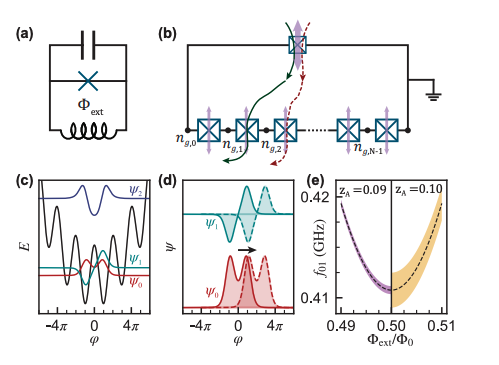Fluxonium qubits, used in quantum computation, are composed of Josephson junctions (JJs) which are crucial to the design of superconducting qubits. Phase slips, a phenomenon in JJs, can lead to decoherence in fluxonium qubits. Researchers at MIT have designed fluxonium qubits with varying impedance, changing the phase-slip rate and characterizing the coherence times. They found that noise, particularly charge noise, can significantly impact the performance of these qubits. This research provides valuable insights into the behavior of fluxonium qubits and how to optimize their performance, contributing to the development of more efficient quantum computing systems.
What are Fluxonium Qubits, and How Do They Work?
Fluxonium qubits are a type of superconducting qubit used in quantum computation. They are composed of Josephson junctions (JJs), which are superconductor-insulator-superconductor weak links. These junctions are central to the design of superconducting qubits, often providing the non-linearity necessary to define the qubit subspace within a spectrum containing many other noncomputational states of the quantum circuit. The strength of this non-linearity is correlated with the magnitude of quantum fluctuations of the gauge-invariant phase difference of the superconducting order parameter across the JJ.
In the regime of large phase fluctuations, JJs can undergo frequent phase slips, which are 2π phase discontinuities that preserve the single-valuedness of the macroscopic wavefunctions of its superconducting leads. In this context, the JJ is often thought of as a nonlinear inductor. Arrays of Josephson junctions can be used to realize nearly linear inductors, including superinductors with impedances approaching or exceeding the resistance quantum at the gigahertz operating frequencies typical of superconducting qubits.
Phase slips can be viewed as the dual process to Cooper-pair tunneling and underpin the dynamics of JJs in superconducting qubits and many other mesoscopic quantum devices. Phase-slip processes have been shown to coherently interfere in arrays of Josephson junctions, a phenomenon referred to as Coherent Quantum Phase Slips (CQPS). The coherent nature of this process implies very little intrinsic dissipation and opens the possibility to realize a reproducible metrological link between current and frequency based on phase-slip elements.
How Do Phase Slips Affect Fluxonium Qubits?
Phase slips occur across all Josephson junctions at a rate that increases with the impedance of the junction. In superconducting qubits composed of JJ-array superinductors, such as fluxonium, phase slips in the array can lead to decoherence. In particular, phase-slip processes at the individual array junctions can coherently interfere each with an Aharonov-Casher phase that depends on the offset charges of the array islands. These coherent quantum phase slips (CQPS) perturbatively modify the qubit frequency and therefore charge noise on the array islands will lead to dephasing.
By varying the impedance of the array junctions, researchers at the Massachusetts Institute of Technology designed a set of fluxonium qubits in which the expected phase-slip rate within the JJ-array changes by several orders of magnitude. They characterized the coherence times of these qubits and demonstrated that the scaling of CQPS-induced dephasing rates agrees with their theoretical model.
What is the Impact of Noise on Fluxonium Qubits?
Noise can have a significant impact on the performance of fluxonium qubits. In particular, charge noise on the array islands can lead to dephasing. The researchers performed noise spectroscopy of two qubits in regimes dominated by either CQPS or flux noise. They found that the noise power spectrum associated with CQPS dephasing appears to be featureless at low frequencies and not 1/f. Numerical simulations indicate this behavior is consistent with charge noise generated by charge-parity fluctuations within the array.
The findings of this research broadly inform JJ-array-design trade-offs relevant for the numerous superconducting qubit designs employing JJ-array superinductors. Understanding the impact of noise on fluxonium qubits and how to mitigate it is crucial for the development of more efficient and reliable quantum computing systems.
What are the Implications of this Research?
The research conducted by the team at the Massachusetts Institute of Technology has significant implications for the field of quantum computing. By systematically tuning the phase-slip rate by changing the impedance of array junctions across six fluxonium qubits, they were able to show a scaling of CQPS dephasing rates over several orders of magnitude. This provides valuable insights into the behavior of fluxonium qubits and how to optimize their performance.
Furthermore, the researchers’ work on noise spectroscopy provides important information on the impact of noise on fluxonium qubits. Their findings that the noise power spectrum associated with CQPS dephasing appears to be featureless at low frequencies and not 1/f, and that this behavior is consistent with charge noise generated by charge-parity fluctuations within the array, provide valuable insights for the design of future superconducting qubits.
Overall, this research contributes to our understanding of fluxonium qubits and provides valuable insights for the design and optimization of future quantum computing systems. The findings of this research have the potential to significantly advance the field of quantum computing and bring us one step closer to realizing the full potential of this revolutionary technology.
Publication details: “Dephasing in Fluxonium Qubits from Coherent Quantum Phase Slips”
Publication Date: 2024-04-03
Authors: Mallika T. Randeria, Thomas Hazard, Agustín Di Paolo, Kate Azar, et al.
Source: arXiv (Cornell University)
DOI: https://doi.org/10.48550/arxiv.2404.02989

